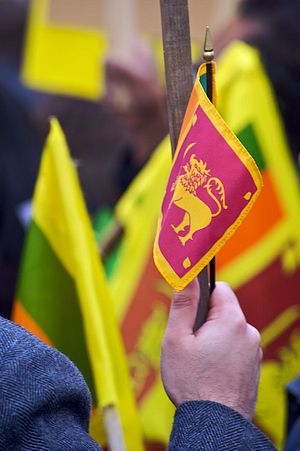While presenting the High Commissioner’s report on promoting reconciliation, accountability, and human rights in Sri Lanka, Gilmore stated that in absence of willingness by the government to tackle impunity and gross violations of human rights, the High Commissioner’s office calls upon the member states to exercise universal jurisdiction.
The report specifically highlights the delays in constituting the long promised transitional justice mechanism on the atrocities and human rights abuses committed by both the Government of Sri Lanka and the Liberation Tigers of Tamil Eelam (LTTE).
The Deputy High Commissioner’s deepening concern comes from the continual lack of compliance in implementing the comprehensive transitional justice agenda originally mandated by the Council resolution 30/01 in 2015.
This 2015 resolution was adopted following the Office of the High Commissioner for Human Rights’ Investigation report on Sri Lanka (OISL) in 2015, concerning the grave human rights violations and related crimes committed by both parties during the conflict. Last year, at the 34th Session, Sri Lanka asked for a further extension of two years to fulfill its prior commitments to the HRC.
So what has Sri Lanka achieved so far? In the last two years, Sri Lanka self-sponsored resolution 30/1, which committed to: review and repeal the Prevention of Terrorism Act; establish a Truth, Justice and Reconciliation Commission; and set up an Office for Mission Persons and an Office for Reparations.
Unfortunately, until now the Sri Lankan government has only shown progress by setting up the Office for Missing Persons in September 2017, almost two years later, and the Office members were not appointed until two weeks before the presentation of the report in the current session.
The Sri Lankan Government has shown no sign of progress on setting up the Truth and Reconciliation Commission and Reparation Programme. The government had not yet made public the draft Bills for a Reparations Office and a Truth and Reconciliation Commission.
Furthermore, the Prevention of Terrorism Act is still in operation and used by the law enforcement agencies. In January 2017, the Committee against Torture noted that the Act is misused to curb the dissent of individuals and politicians and also restricted access to lawyers to facilitate enforced disappearances. Torture continues to be a common practice and is routinely used by police during investigations. The culture of impunity remains deeply entrenched in the system.
When ratifying the Convention on Enforced Disappearances, Sri Lanka had accepted the competence of the Committee on Enforced Disappearance (the Committee), but rendered the ratification ineffective by not accepting the individual complaint procedure; this would have allowed individual victims to file complaints to the Committee. Further, the domestic penal code is yet to criminalize enforced disappearance.
The report suggests that key preconditions for transitional justice remain unfulfilled. Assaults, death threats, surveillance and harassment of human rights defenders and victims of violations have continued.
The Sri Lankan government has been promising and seeking extension for implementation without showing any effective measures taken as echoed in the High Commissioner’s report. Furthermore, in repeatedly delaying and diluting the possibility of fixing accountability for gross violations of international human rights law and international humanitarian law, it is effectively ensuring impunity.
Victims of grievous harms remain voiceless and perpetrators can inhabit communities and go about their lives freely, thereby eroding the trust so vitally needed for sustained peace and development on the Island.
If Sri Lanka wants the international community to believe in its good intention, it must use the remaining period effectively and by 2019 implement the pledges made in the past. The government’s efforts must not aim to appease the international community but to fulfill its promise to its own minority that peace will be based on justice.
































